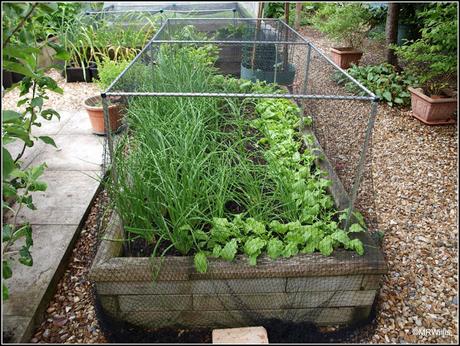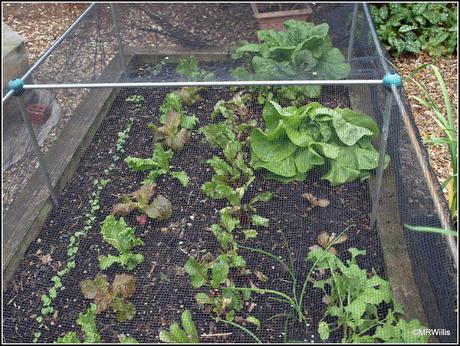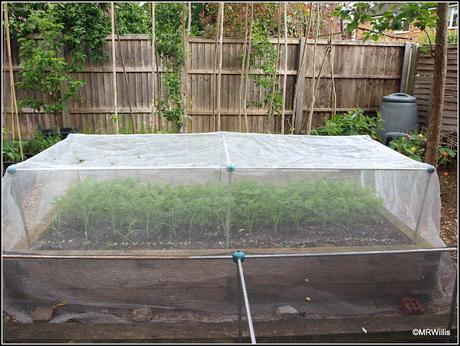I have found through bitter experience that if I don't protect seeds recently sown and young plants they WILL be destroyed. Years ago I often used to wake to a scene of devastation in my garden, where overnight "diggers" (presumably cats, foxes and badgers) had dug huge holes in my raised beds in their search for worms and insects - or in the case of the cats, somewhere to use as a toilet! As my collection of garden hardware has increased, I have gradually been able to substantially reduce this problem. Over each raised bed I usually construct something like this:

It consists of a frame made of lightweight aluminum rods, held together with plastic connectors, over which is draped a net. In the case of the one seen above, it is netting marketed as anti-bird netting, which has quite a large mesh. I secure it at ground level with bricks or large pieces of scrap wood.
My salads bed is currently protected in a similar but slightly different fashion. This construction features the well-known Build-a-Ball connectors, and a net with a finer mesh which is marketed as anti-butterfly netting.

Over the bed which contains my carrots I have deployed yet another type of netting - very fine mesh intended to keep out the Carrot Root Fly. This stuff is "Enviromesh", which I have found to be very effective.

I have found that all these types of netting are sufficient to deter the diggers. I have never yet had any of the net-support structures damaged.
I buy most of my netting, rods and connectors from a company called Gardening Naturally. I find them very efficient and their prices seem reasonable. They have a very wide range of useful gardening equipment. The stuff I have bought is all in kit form and can be assembled into many different configurations, depending on the needs of the moment. It can also be quickly disassembled for ease of storage when not required. The aluminum rods I use will last more or less indefinitely, and even the netting is good for several years, so I think it makes sense to buy good purpose-made items if you can afford to, rather than cobbling together something made out of old bits and pieces. Most of the items can be bought individually - you don't need to purchase a complete set - so you can keep on adding to your collection in small increments whenever funds permit!
I haven't got any brassicas in the ground yet this year, but when I have I shall be very tempted to add a length of Gardening Naturally's ultra-fine veggiemesh to my collection, because it looks to be perfect for the task. My brassicas often suffer from infestations of Whitefly and aphids, and I think the ultra-fine veggiemesh would keep them out.
One thing to think about if you are going to cover crops with netting is the amount of light they let through or keep out. I have found that the black netting does have an effect on light levels, even if the net has a wide mesh. In theory then, it is best to remove the nets when you think the plants underneath are out of danger. Unfortunately, in my case that seems to be never! A badger is a strong animal and can make short work of pretty much any vegetable, so I prefer to keep my crops covered until maturity if at all possible. In a similar way, just be aware that fine mesh coverings like Enviromesh can reduce the amount of benefit that plants derive from rain, and you may have to compensate for this with additional hand watering.
